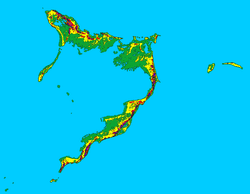Crooked Island, Bahamas
| District of Crooked Island and Long Cay | |
|---|---|
| Island and district | |
.svg.png) | |
| Coordinates: 22°45′N 74°13′W / 22.750°N 74.217°W | |
| Country | Bahamas |
| District | 1999 |
| Government | |
| • Type | District Council |
| • Chief Councillor | David Daxon Sr. |
| Area | |
| • Total | 148 km2 (57 sq mi) |
| Population (2010) | |
| • Total | 330 |
| • Density | 2.2/km2 (5.8/sq mi) |
| Time zone | EST (UTC−5) |
| • Summer (DST) | EDT (UTC−4) |
| Area code(s) | 242 |

Crooked Island is an island and district, part of a group of Bahamian islands defining a large, shallow lagoon called the Bight of Acklins, of which the largest are Crooked Island in the north and Acklins in the south-east, and the smaller are Long Cay (once known as Fortune Island) in the north-west, and Castle Island in the south.
History
The islands were settled by American Loyalists in the late 1780s who set cotton plantations using over 1,000 slaves. After the abolition of slavery in the British Empire these became uneconomical, and the replacement income from sponge diving has now dwindled as well. The inhabitants now live by fishing and small-scale farming.
It is believed that the first Post Office in the Bahamas was at Pitt’s Town on Crooked Island.
Population
The main town in the group is Colonel Hill (pop. 51) on Crooked Island.
The population of Crooked Island was 330 at the 2010 census.[1]
Transportation
The island is served by Colonel Hill Airport.
References
- ↑ CROOKED ISLAND POPULATION BY SETTLEMENT AND TOTAL NUMBER OF OCCUPIED DWELLINGS: 2010 CENSUS - Bahamas Department of Statistics
Coordinates: 22°45′N 74°13′W / 22.750°N 74.217°W